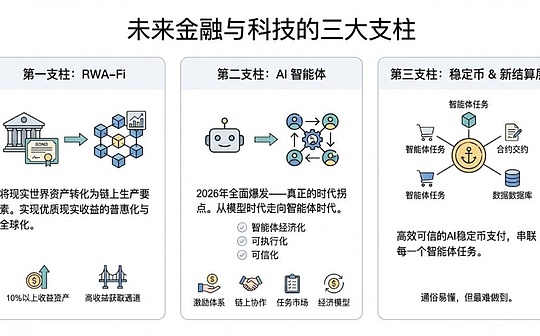
With the implementation of the MiCA Act, Web3 companies are increasingly enthusiastic about going overseas in Europe.Mankun Law Firm has recently received a large number of consultations about European Web3 friendly countries. To this end, we have specially launched a series of articles to deeply analyze the crypto ecology of European countries.In this issue, we will focus on the Polish market with great potential.
Poland: Web3 market with great development potential
Polish economy has development potential
The Polish economy occupies an important position in the Central European economy and is one of the important economies in the EU. Its total economic output is currently ranked 6th among the 27 EU countries.
According to the 2023 report of the FinTech Foundation, the Polish fintech ecosystem has started late but has great potential.As the largest financial services market in Central and Eastern Europe, Poland is attracting talents and investment in the region, and the good macroeconomic trend also indicates its broad development prospects.
Poland’s establishment of entities is favored by Web3 companies
Poland is an important business center in the Central and Eastern Europe region, attracting many companies to set up entities here. Nearly 40% of the 500 largest companies in Central and Europe are located in Poland.This trend also extends to the Web3 field.
As of 2024, the number of VASP entities actively registered in the Polish virtual currency activity register has exceeded 1,100.,Shows a booming trend in this field.
Currently, there are 126 Web 3.0 startups in Poland, including billion, Golem Network, GamerHash, Fluency, and DoxyChain.
Poland has a considerable number of potential Web3 users
Poland has a population of about 38.26 million, ranking fifth in the EU.According to the Polish Cryptocurrency Popularity report released in 2023, Polish people have a high awareness of cryptocurrency, and more than 94% of respondents said they have heard about it.However, the proportion of real in-depth understanding of cryptocurrencies is relatively low, at about 6.2%, indicating that the market still has a lot of room for popularity.
The report notes that in Poland, cryptocurrencies are mainly used as investment and speculative assets, and more than half of respondents use it for this purpose.They are rarely used as tools to participate in blockchain-based projects, purchase products and services, or transfer funds.
Poles declared a median funding for investment in cryptocurrencies of 1,000 zloty,Average is 7642 Zloty, the average after excluding the 5% extreme value is 5149 zloty.
Men invest in cryptocurrencies three times more frequently than women.young people(Under 34 years old)occupy41% of all those who claim to own crypto assets.In addition, the penetration of cryptocurrency ownership has also increased with the improvement of education.
Polish Web3 Regulatory Authority
The main financial regulators in Poland areFinancial Regulatory Bureau (“KNF“), function similar tomy country’s State Administration for Financial Supervision and Administration.
KNF regulates banks, capital, insurance and pension departments, payment institutions, etc.The purpose of KNF to regulate financial markets is to ensure the normal operation of financial markets, ensure the stability, security and transparency of financial markets, and ensure that market participants’ confidence in financial markets and their interests are protected.
KNF is also responsible for overseeing Web3 companies that conduct business activities in Poland or are established in Poland.
On November 7, 2024, Polish KNF issued a public warning to Foris DAX MT, a company headquartered in Malta and operated under the Crypto.com brand, saying it was suspected of conducting unauthorized financial activities in Poland, according to Cointelegraph.
KNF department head Jacek Bardzczewski explained that under Polish law (part 178 of the Financial Instruments Exchange Act), entities that provide brokerage or investment services must hold appropriate licenses to conduct business legally.
Polish crypto-regulatory policy framework
Poland sets shorter transition periods for existing VASP license entities
With the EU’s Crypto Asset Market Supervision Regulations (MiCA) officially came into effect on December 30, 2024, cryptocurrency regulation in Poland is undergoing important regulatory changes.Poland is currently advancing domestic legislation that is in line with MiCA, and its draft is called the Polish Crypto Assets Market Law.On December 9, 2024, the Polish Government Legislative Center website announced the highly-watched“Polish Crypto Asset Market Law” (Fourth Edition).This Act is particularly important for entities currently registered in the VASP Register and for other entities preparing to apply for a CASP license.The draft bill is currently in the government stage and has not been submitted to Parliament for adoption.Therefore, in the further legislative process, the bill may be amended.But the overall legislative direction of the bill will not change fundamentally.
Overall,The draft Polish Crypto Assets Market Law significantly shortens the transition period stipulated by MiCA.
The transition period stipulated in the EU MiCA Act is until July 1, 2026, andaccording toThe relevant regulations of the “Polish Crypto Asset Market Law” are currently registered asVirtual AssetsThe entity of the Service Provider (VASP) is required to submit a CASP license application by June 30, 2025.
If an entity that has obtained a VASP license is by May 1, 2025A full CASP license application has been submitted and a notification from UKNF receives the application, it canServices are provided for an extended period until September 30, 2025,Or until the date of obtaining or refusing the license, whichever is earlier.
If the entity does not register a virtual asset license, it is necessary to register the latest CASP license before it can conduct business activities in the EU.
It is worth noting that the original VASP registration system will be completely abolished from October 1, 2025.

To sum up, Poland’s draft Crypto Assets Market Act significantly shortened the transition period stipulated in the EU MiCA Act, and proposed an earlier application deadline for existing VASP entities, and set a clear repeal of the VASP registration system.time.Poland intends to accelerate the implementation of supervision, promote market transparency and compliance, and align with MiCA as soon as possible.
Penalties that may face when obtaining a Polish CASP license
After completing the license registration, cryptocurrency companies must comply with the MiCA Act and regulatory provisions of Polish crypto assets, identify and evaluate the risks of money laundering and terrorist financing related to their activities, identify suspicious transactions, implement risk mitigation measures, and regularly use designated portals toRegulatory authority reports (usually by quarter).They must also comply with the Financial Action Task Force standards and manage crypto transactions responsibly in the cryptocurrency field.
If the post-registration obligation is not fulfilled properly or fails to perform, the Polish authorities may impose administrative penalties on relevant subjects and individuals.In addition, persons acting on behalf of the entity may be criminally liable for breach of certain provisions.These penalties include:
·Publish information about the entity and its illegal activities in the Public Information Announcement on the Office Website of the Services of the Finance Minister,
·Order to stop the entity’s specific actions,
·Remove from the registry of activities in the virtual currency field,
·Personnel responsible for the following matters are prohibited from performing their management duties within no more than one year:
·Economic penalties, up to twice the amount of losses gained or avoided by the entity due to infringement, or up to an equivalent amount of €1,000,000 if the amount of such benefits or losses cannot be determined.
In addition, persons acting on behalf of the entity may be liable if they fail to inform the Polish authorities of the suspect or provide false or concealed real data about transactions, accounts or personnel.criminal responsibility, was punished3 months to 5 years in prison.
How does Poland impose taxes on crypto assets?
Virtual AssetsTax regulations in Poland are very mature.
Back in November 2020, the Polish authorities released a new PIT-38 (Personal Income Tax) form to facilitate Polish residents to declare cryptocurrency taxes.
In Poland, taxation of cryptocurrencies follows specific guidelines based on the country’s tax laws.According to “Personal”Income Tax, virtual currency is defined as a digital representation of value, which can be converted into legal currency and accepted as a means of exchange.However, it should be noted that virtual currencyNot includedCertain categories, such as fiat currencies issued by national banks, international accounting units, electronic currencies, financial instruments, bills of exchange and checks.These exclusions further clarify the definition of virtual currency, making tax processing more targeted and consistent.
In terms of taxation, the income generated by cryptocurrency transactions is considered monetary capital income.Handling virtual currencies in exchange for payments involves different situations:
-
Convert virtual currencies to fiat currency (for example, convert cryptocurrencies to fiat currency)
-
Virtual currency exchange goods, services or property rights
-
Pay off debts with virtual currency
-
Mining and participating in initial token offerings (ICOs)
It is worth noting thatNot only does converting virtual currencies into fiat currencies create tax obligations, but also tax obligations in exchange for goods, services or property.However, converting one cryptocurrency to another or converting it into a stablecoin does not create a tax obligation.Although some transactions are not subject to taxation, taxpayers still need to keep relevant records for audit or inquiries.
Poland’s tax rate on cryptocurrencies is 19%.In this case, there is no specific tax threshold and all income from cryptocurrencies, regardless of the amount, is subject to a tax rate of 19%.Investors must accurately report their income from virtual currencies and fulfill their tax obligations accordingly.
The Polish government does not consider cryptocurrencies to be “a unit of currency, payment instrument or electronic currency”, so people who engage in crypto business in Poland must provide financial statements of cryptocurrency exchanges they use to buy and sell digital currencies to report them correctlyProfits earned from cryptocurrency transactions.
For example, Mr. Zhang purchased 1 Bitcoin for 10,000 zloty on January 1, 2023.On May 1, 2024, he sold the Bitcoin for 15,000 zloty.
·income:15,000 zloty
·cost:10,000 zloty
·profit:15,000 zloty – 10,000 zloty = 5,000 zloty
·Taxes to be paid:5,000 zloty * 19% = 950 zloty
Mr. Zhang needs to declare and pay the 950 zloty as personal income tax (PIT).
Summary of Lawyer Mankun
As an important economy in Central and Eastern Europe, Poland has an active Web3 user group and a constantly improved regulatory framework, which provide good development opportunities for Web3 companies and make Poland an increasingly favored destination for Web3 entrepreneurs.However, the entry into force of the EU MiCA Act and the introduction of the local virtual asset regulatory framework in Poland in the future will also bring new compliance challenges.








